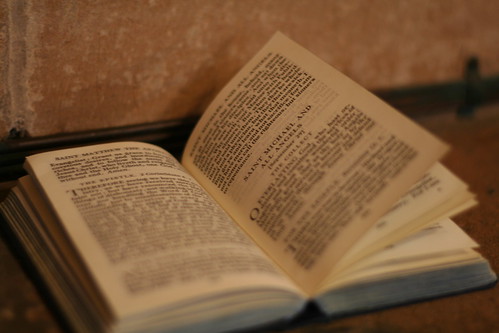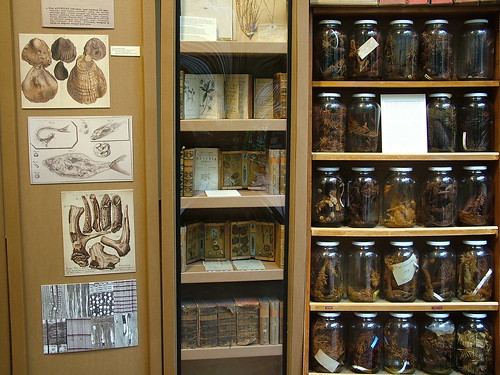
In the Edification Hall of Tainan’s Confucian Temple. By nnice.
One of the implications of public Christianity is that, though education belongs properly to the parents and not to the ordained ministry or the magistracy, homeschooling is not the panacea some Christians make it out to be, because it privatizes a public matter. If we disagree with the defence of abortion which designates it a private matter of personal choice, perhaps we may see that the same applies to schooling: education, like the creation and destruction of life, is not a commodity for private consumption. Therefore, since education is a public matter, the public good calls for Christian parents not to conduct their children’s education in isolation from the public square. Sometimes a relative withdrawal may be tactically necessary for Christians to educate our children in the right way – that is, the truth – but such withdrawal is not the ideal.
What the Church truly desires in education is a public life that holds all truth necessary for the high attainments of civilization, and especially is congenial to the Christian faith which enables civilization’s best and most lasting state. By the common grace of God, pagans have achieved much, even in the way of public justice; but the Christian knows, as both historical experience and the Scriptures tell, that the virtue of human society at which education aims, in order to be sustained and fulfilled, depends on mankind’s regeneration by the word of God and particularly by the gospel of Jesus Christ. So, then, both for the good of the city and for the æternal salvation of men, Christian parents must work to make the public system of education a place hospitable to the gospel.
At the same time, as Steven Wedgeworth says,
The home needs to also be supported, promoted, and protected, and it needs to live in a friendly relationship with the rest of society rather than the hostile one it has been in for the past few decades. And that hostility is most definitely a two-way street. Too many conservatives view their home as a defense-only citadel. But this can’t work, and as we’ve said, the home has already been long emptied. The home instead needs to be a thriving part of the community.
For a school to be truly hospitable to the gospel and the flourishing of human society, it will have to respect the place of family and home, yet draw families together for the common and public good. Somehow, the responsibility and authority of parents and the use of the public schools will have to work together in a way that honours God.

Analects of Confucius. Östasiatiska Museet, Stockholm. By Erlend Bjoertvedt.
In some states, I think this synergy can be served by charter schools, which receive public funding but are not run by the (often) secularist state. The hope of charter schools has always been to invigorate the state schools, and in the matter of religion this is no less the case. Chicago already has charter schools run by the La Sallians, so more charter schools run by Christians should be no problem; what remains is to establish some things a charter school should do, as an example to the state schools, to be friendly to the true faith.
First, it should give parents the freedom to have their children observe religious discipline. The school schedule and calendar should be so arranged as not to obstruct daily prayers and holy day services. They should, therefore, leave time for students to pray in both the morning and the late afternoon, as well as to attend church services during Christmas, Holy Week, Easter, Ascension, and Whitsun Week. More positively, before school and after school there may be chaplains to lead Morning Prayer and Evening Prayer, and chaplains may also be available once a week to give spiritual counsel. An after-school club may also be devoted to discussing the Prayer Book catechism; the Baptists, the Jews, and the Muslims could have their own clubs at the same time.

By quimby.
Second, for the Trivium, the curriculum should be ordered toward nurturing students in their knowledge of the Christian cultural heritage. In foreign languages, as the Ben Gamla charter schools teach Hebrew, so Christian-friendly charter schools can easily require Latin, with stronger precedent than for Hebrew. Elsewhere in the humanities, teachers may give particular attention to biblical history and literature, as well as to Western Christian literature and the religious history of Europe and America. Teaching this material, after all, makes everyone more literate, not just Christians. Augustine and Donne, Maimonides and Judah Halevi, these are thinkers whose works would do good for all modern students to experience. Intentionally teaching students to become conversant with the Christian tradition is of utmost importance, and there is plenty of excellent material to read and discuss.
Third, in the natural sciences, the honest thing to do is to teach what everyone learns about evolutionary biology but also to discuss data (or lack of data) that Mayr, Gould, and others have admitted to be problematic. There is no question that Creationism is not science, but all students stand to gain from honest enquiry in natural science. They would learn a great deal from teachers showing them the questions that continued to occupy scientists today. In natural history, likewise – in astronomy, geology, and palæontology – it is responsible to stress that one does not draw conclusions in the same manner as in other fields of natural science, since repeated and controlled experiments in natural history are intrinsically impossible. By right reason, nothing in the natural sciences actually destroys Christian faith. Taught well, Christian students should see that natural science is not a threat to their faith, and students of a scientific inclination should see that religious faith is not a threat to science; honesty and truth are virtues that no one, Christian or atheist, needs to give up.

By dzsil.
Fourth, a charter school congenial to the Christian faith supports the integrity of family life. Students who live close enough to the school, perhaps, can go home for lunch; for those who cannot, it seems good to use only humanely obtained kosher meat and offer vegetarian options. Perhaps even more importantly, the school should keep homework to a minimum – look at all the happy Dutch children. It is also worth looking into arrangements in which students can learn at home some days of the week, as well as accommodations for homeschoolers who wish to join certain classes. On the teachers’ end, I think it best if both regular and substitute teachers can work part-time without losing their health insurance benefits. By serving the families of both the students and the teachers, schools better honour the God who made us able to learn.

By Aikawa Ke.
The example of charter schools that did all this, even if state schools could not do everything the same way, could encourage state schools to improve the way they did things and become better places for both Christian and non-Christian parents to send their children. It is not always clear what can legally be done, and close ties between Christian groups and schools can be controversial, but I think the idea should be tried. What do you think?


Sounds good, I’d send my kid to a school like that. For now I’m contemplating Lutheran and Catholic parochial school options. Sadly both are expensive.
LikeLike
How much do they charge? My impression was always that people tried to make parochial schools affordable in order to reach everyone.
Also, how hard do you think it would be in Nebraska to convince school boards that such a proposal was not sectarian? In California I expect it would be exceedingly difficult: the prevailing culture of the Bay Area is so anti-Christian.
LikeLike
Sending them to a Catholic school is significantly less expensive than the Lutheran option.
I couldn’t really say. Omaha is a pretty divided town, and I think most people would probably just say “that’s what we have private schools for.” There is also some resentment already amongst the different public school districts. I think this sort of thing might be more likely to get the votes in Omaha if the school was located in, and served an impoverished area?
LikeLike
Probably would. Are there such neighbourhoods? One potential point of conflict is if anti-Christian parties accuse Christians of exploiting people’s poverty to indoctrinate them.
And wow, for the price of one kid at the Lutheran school you could send four to the papists.
LikeLike
There are several places that would fit the bill. I don’t know if that’s really an issue around here. The most successful suppliers of housing, free medical care, and other services to the poor in Omaha are all Catholic/Christian.
For an interesting comparison of tuition. Here’s what the once-episcopal affiliated school in town costs:
LikeLike
Another contested example I found recently: http://www.nysun.com/new-york/church-sues-for-right-to-run-charter/65296/.
LikeLike